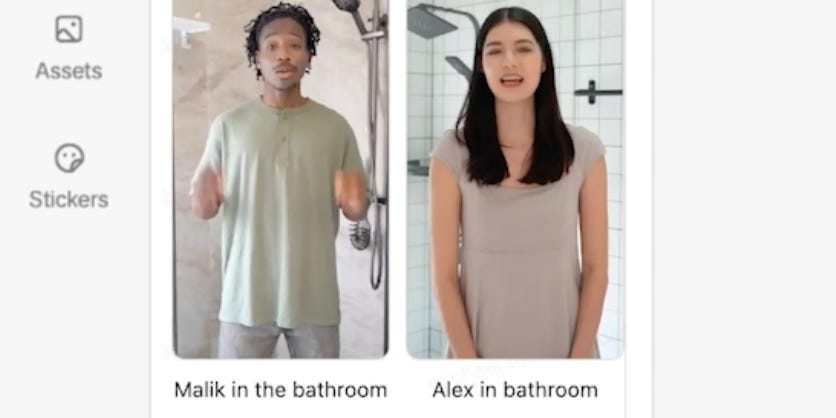TikTok is rolling out tools that allow brands to use AI-generated avatars of real people in ads on the platform.
The company will offer a set of “stock avatars” trained to resemble the likeness of paid actors licensed for commercial use, and will allow advertisers to create custom avatars designed to resemble TikTok creators and brand spokespeople in multiple languages. The company said in a June 17 blog post that it is testing the feature with creators and will label ads made with the tool as AI-generated.
In a demo in the announcement, the company showed off AI-generated avatars of what appeared to be TikTok creators to explain why an AI tool that uses their likeness could be useful: Symphony Avatars “helps brands and creators move faster, create more content, and reach more people,” one person said.
The video also boasted that the avatars could create content quickly, produce product explainer videos in minutes, and speak multiple languages.
Some creators are wary of generative AI
Of course, not all creators are on board with the idea of AI-generated influencers. Earlier this year, when an ad featuring AI-generated avatars by marketing company SelfMade went viral, some creators raised alarms about how generative AI could impact their lives and the future of the creative industry.
“If this goes viral, I'm very concerned about the future of my business,” micro-influencer Kristen Bousquet told Business Insider in May.
AI tools have come under fire across the creative industries, as Hollywood screenwriters, actors, musical artists, journalists and others worry that allowing artificial intelligence platforms to learn their work could ultimately cost them their jobs.
In the past, unauthorized deepfake influencer ads featuring creators like MrBeast have appeared on TikTok and other platforms. TikTok's Symphony Avatars product could be confusing for users who published AI-generated videos with the creators' consent.
In its blog post, TikTok appeared to address some of the concerns, at least on the brand side, that AI will replace creativity.
“TikTok Symphony is designed to enhance and amplify human imagination, not replace it,” the company wrote. “We handle the heavy lifting, freeing you and your team to focus on the strategic and empathetic aspects of TikTok marketing.”
The company presents the Symphony Avatar as an opportunity for influencers to save time and expand brand deals by lending their likeness to a brand's global campaigns in countries where they don't speak the language.
The company has also formed an industry advisory board for its AI program that includes content creators and representatives from brands like American Eagle, Wendy's and the NBA, which will serve as “an open forum to discuss the application and use of AI in creative marketing and across industries,” the company said.
TikTok isn't the only big tech platform experimenting with AI-generated avatars. Last year, Facebook-owned Meta released an AI chatbot featuring likenesses of celebrities, including Tom Brady, Kendall Jenner and YouTuber MrBeast. The company also offers a suite of generative AI tools that allow advertisers to enlarge images, change backgrounds and test different text variations. Google, Microsoft and Apple are all racing to introduce more generative AI features into their products. Snapchat has its own AI chatbot called My AI, but the company recently downplayed the role of AI on its platform in its NewFronts pitch for brands.
June 18, 2024: This story has been updated with additional details.

